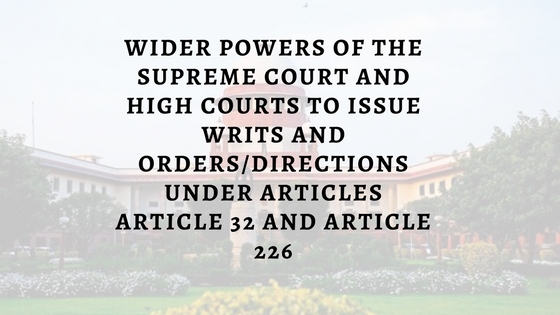
Aapka Consultant Judgment Series- In this series, we are providing case analysis of Landmark Judgments of Hon’ble Supreme Court of India.
Deepak Bajaj vs. State of Maharashtra
AIR2009SC628, (2008)16SCC14, 2008(14)SCALE62
Hon’ble Judges/Coram: Altamas Kabir and Markandey Katju, JJ.
Decided On: 12.11.2008
FACTS:-
This writ petition has been filed under Article 32 of the Constitution of India to challenge the detention order dated 22.05.2008 passed against the petitioner, Deepak Gopaldas Bajaj, resident of Mumbai under Section 3(1) of the Conservation of Foreign Exchange and Prevention of Smuggling Activities Act, 1974 (in short ‘the Act’). An objection has been taken by the learned Counsels for the respondents that this petition should not be entertained because the petition has been filed at a pre-execution stage i.e. before the petitioner has surrendered or was arrested. In response to that court says that the legal position regarding the power of this Court or the High Court to set aside a preventive detention order at the pre execution stage needs to be further explained.
ISSUES:-
- Whether a ratio decidendi of a case can be applied without perusing the facts of a particular case?
- Whether the Court can issue a writ to the petitioner before he is put into detention?
JUDGMENT:-
At preliminary stage of this petition, an objection has been taken by the learned Counsels for the respondents that this petition should not be entertained as it is filed at a pre-execution stage i.e. before the petitioner has surrendered or was arrested, and in support they placed a heavy reliance on the five grounds on which the courts can interfere in pre-detention order as laid in Additional Secretary to the Government of India and Ors. v. Smt. Alka Subhash Gadia and Anr. 1992Supp(1)SCC496. In response to this objection court says that the legal position regarding the power of this Court or the High Court to set aside a preventive detention order at the pre execution stage needs to be further explained. After doing a careful perusal of the observations in Smt. Alka Subhash Gadia’s case (supra) court was of the opinion that the five grounds mentioned therein on which the Court can set aside the detention order at the pre execution stage are only illustrative not exhaustive. While referring to previous Supreme Court judgments and some UK judgment, the Court held that a judgment of a Court is not to be read mechanically as a Euclid’s theorem nor as if it was a statute and that too taken out of the context. It further reiterated the point that Courts should not place reliance on decisions without discussing as to how the factual situation fits in with the fact situation of the decision on which reliance is placed.
Applying the above principles on the particular contention raised by the Respondents, Court held the view that Smt. Alka Subhash Gadia’s case (supra) cannot be construed to mean that the five grounds mentioned therein for quashing the detention order at the pre execution stage are exhaustive. And, in consequence, Court reasoned it further and said that if a person against whom a preventive detention order has been passed comes to Court at the pre execution stage and satisfies the Court that the detention order is clearly illegal, there is no reason why the Court should stay its hands and compel the petitioner to go to jail even though he is bound to be released subsequently (since the detention order was illegal).
The Court disagreed with the proposition of respondent that a writ of habeas corpus lies only when there is illegal detention, and in the present case since the petitioner has not yet been arrested, no writ of habeas corpus can be issued. The Court gives two reasons for its disagreement. Firstly, Article 226 and Article 32 of the Constitution permit the High Court and the Supreme Court to not only issue the writs which were traditionally issued by British Courts but these Articles give much wider powers to this Court and the High Court. This is because Article 32 and Article 226 state that the Supreme Court and High Court can issue writs in the nature of habeas corpus, mandamus, certiorari, etc. and they can also issue orders and directions apart from issuing writs. The words `in the nature of’ imply that the powers of this Court or the High Court are not subject to the traditional restrictions on the powers of the British Courts to issue writs. Secondly, what the petitioner really prays for is a writ in the nature of certiorari to quash the impugned detention order and/or a writ in the nature of mandamus for restraining the respondents from arresting him. Hence even if the petitioner is not in detention a writ of certiorari and/or mandamus can issue.
HELD:-
A judgment of a Court is not to be read mechanically as a Euclid’s theorem nor as if it was a statute and that too taken out of the context. In light of this principle the Court allowed the writ petition on the ground that the relevant material was not placed before the Detaining Authority which makes the detention order illegal.
To Get Legal Opinion from Advocates/ Legal Experts, Please click here
To Get Legal Opinion from Retired Hon’ble Judges, Please click here











